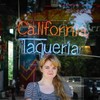The Vagina Monologues has a certain retro 90s appeal. The play that empowered suburban moms across America and beyond is two decades old now, and its earnest feminism feels dated in a loveable Phoebe-from- Friends kind of way. The title is literal: women performers recite vulva-centric stories about childbirth and pap smears and masturbation and sexual assault. The script is honest and liberating and has been performed by celebrities and community theatre troupes alike. But is it relevant to millennial feminists?
Advertisement
Easy to argue not. In this cultural moment, a certain kind of (straight, white, able-bodied) woman feels a little too empowered—or at least a little too in the spotlight. The Ivanka Trumps and Beckys of the world, you could argue, need to step back and adopt an activism that isn't centred in the self. The trans movement, too, has sought to define "womanhood" beyond its assumed biological borders.The woman who wrote The Vagina Monologues is actually inclined to agree. Eve Ensler and I are speaking ahead of her panel appearance at Sydney's Antidote Festival of Ideas, where she will discuss the politics of her play, particularly its once-radical suggestion that women should take ownership of and celebrate their bodies. Ensler is focused, though, on the big picture. "I've got no room for a feminism that isn't intersectional," she tells me. "There's no way we can think about violence against women, for example, without thinking about racism. Without thinking about the squandering of the environment, without thinking about class. Right?"Right. And in fact it's ending violence against women—all women, including but not limited to those in the 140 countries in which her play has been performed—that Ensler sees as her true cause. Using the platform the success of The Vagina Monologues has afforded her, Ensler has spent the past two decades campaigning hard against rape and sexual assault. Her "global movement," One Billion Rising, organises rallies against sexual violence around the world; it takes its title from the UN statistic that one in three women will be raped or beaten in their lifetime.
Advertisement
Still, she's reluctant to say that the play's original message is obsolete, despite wishing it were so. The pain and confusion that come from being born with female sexual organs lingers; women are still shamed for their unshaven bikini lines, are still unsure how to masturbate, are still being raped, are still giving birth and having their bodies irrevocably changed by the experience.With the type of sexual liberation The Vagina Monologues preaches, Ensler says, comes other freedoms. "The repression of someone's sexuality is the repression of their life force. Repression of ambition, of creativity. We can see how that repression acts in all aspects of modern life… When we have an agency over our bodies and desire, know that we're entitled to pleasure without guilt and shame, it changes everything."Not every woman has a vagina, or wants to be defined by their vagina, or is willing to get on stage and recite long, frank speeches about their vagina. Ensler's been met with criticism and boycotts—in 2012, all-women's liberal arts school Mount Holyoke College discontinued its annual performances of the play citing transphobia. "Gender is a wide and varied experience, one that cannot simply be reduced to biological or anatomical distinctions," read an all-campus email on the subject.But as Ensler cautions, "one play can't be everything." She's adamant that The Vagina Monologues has always been as inclusive as possible, and transgender women have been performing it for decades. Ensler had a hand in the first all-transgender casting of the play ("ten years ago, by the way") and notes that while a vagina-centric piece of art won't relate to every woman's experience, it will still resonate with millions. "The play has never been saying that the vagina is what defines the woman," she says. "It's just a play about vaginas. And that's not to say that there shouldn't be plays about transgender women or any other kinds of women. [But] I wrote this play."
Advertisement
Is it annoying to slide out of favour with the feminist movement when you were once considered one of its great figureheads? In 2006, The New York Times called it the "most important piece of political theatre of the past decade". It has been translated into 48 languages. Ensler doesn't say so in as many words, but she does question the notion that new forms of activism replace the old. "Three billion women have vaginas, so that's a lot of women. I think we have to get out of this 'either, or'. To be inclusive doesn't mean we erase ourselves. It means we bring everybody into the mix with what they have to say and what their issues are."Indulging in some of that patchouli-scented, period blood-stained 90s feminism, I ask Ensler how her vagina is feeling lately. Not so good, it turns out. "My vagina is distraught about the state of the world right now, actually." Oh. "The rise of fascism, what we're doing to the environment, rising levels of poverty, what we're doing to refugees… the world is in a really tumultuous state."She might have got her start writing obscure, off-Broadway plays in the 80s and 90s, but Ensler is a modern-day activist. Committed to fighting the "multiple oppressions that have to be addressed if we want liberation" and willing to interrogate the inclusiveness of her own work. She says self-reflection is more crucial than it has ever been."Women now more than ever have to be bold, be in solidarity, to rise up. Trump is teaching us is how deeply racist and sexist and homophobic this country is. There's a moment of truth happening. There's no hiding anything anymore. It's here, you know?"Follow Kat on Twitter
